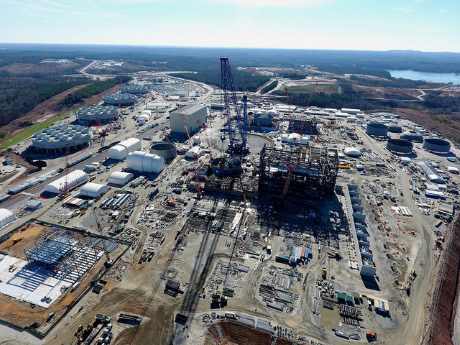Scana to evaluate Summer options
30 March 2017
Scana Corporation is considering whether to complete or abandon one or both of the Summer AP1000 units as it begins a 30-day evaluation of information provided by Westinghouse on its filing yesterday for Chapter 11 protection from creditors, Scana's CEO said. Westinghouse made the filing to enable strategic restructuring amid "financial and construction challenges" in its four US AP1000 power plant projects.
 |
| Construction at Summer units 3 and 3, pictured in January 2017 (Image: SCE&G) |
Two of those units - Summer 2 and 3 - are being built for Scana subsidiary South Carolina Electricity and Gas (SCE&G) and co-owner Santee Cooper. Both Westinghouse and its majority owner, Toshiba, stressed that only Westinghouse's US operations would be affected by the filing.
Scana CEO Kevin Marsh said yesterday that Scana and Santee Cooper had reached an agreement with Westinghouse to allow the continuation of work on the project during an initial 30-day transition and evaluation period, during which Scana will begin work to determine the "most prudent" path forward for the project. The agreement is subject to the approval of the bankruptcy court.
Marsh said Westinghouse had provided Scana with an estimate of the additional cost of completing the project, beyond that already provided under existing agreements. He said Scana would review the estimate, but that it expects resources from Westinghouse and Toshiba - including a so-called parental guarantee from Toshiba - to be adequate to compensate Scana for the additional costs. These, together with a surety bond and an escrow of AP1000 intellectual property and software, would be considered as Scana determines to course it wants to take, he said.
Scana will evaluate various options during the coming 30 days, Marsh said. These include: continuing with the construction of both new units; focusing on the construction of one unit, and delaying the construction of the other; continuing with the construction of one and abandoning the other; and abandoning both units. Should an option involving abandonment of one or both units turn out to be the best option, he said, Scana will seek recovery under the provisions of South Carolina's Base Load Review Act.
In answer to questions, Marsh said the company must evaluate all the options open to it before arriving at a decision, but that his own preferred option would be to complete the project. "We built these plants because we needed generation for our service territory. We were looking for a long-term clean energy solution, which these plants provide … If we just cancel these plants we still have a generation issue we need to face," he said. "Our commitment is still to try to finish these plants - that would be my preferred option before going through the evaluation. The least preferred option, realistically, is abandonment," he said.
As well as the Summer units, Westinghouse is building two AP1000s at Vogtle for Southern Company's Georgia Power. Marsh confirmed that Scana worked with Southern on the interim agreement, and that the companies were communicating with each other with the consent of Westinghouse and Tohsiba. He said both companies had an interest in completing their projects, but noted that the contracts for the projects are different.
Four AP1000 units are under construction in China - two each at Sanmen and Haiyang- and are all scheduled to be in operation by the end of this year. As the bankruptcy filing only affects Westinghouse's US operations, the Chinese projects are not expected to be affected. The chairmen of China's State Power Investment Corporation and State Nuclear Power Technology Corporation yesterday said they had been in communication with Westinghouse executives over the bankruptcy and reorganisation, and the two sides had agreed to prioritise completion of the Chinese reactors.
Construction of the four US units began in 2013. They are scheduled to start operations between 2019 and 2020.
Researched and written
by World Nuclear News